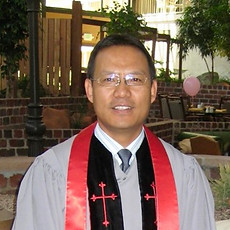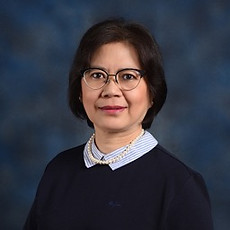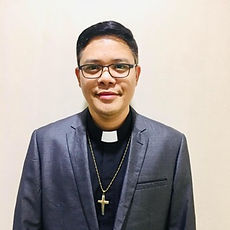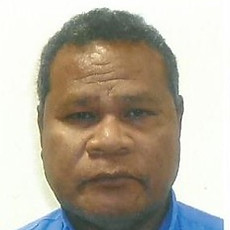
ASIAN PRACTICAL THEOLOGY
INTERNATIONAL CONFERENCE 2025
INTERSECTION OF TRAUMA AND PRACTICAL THEOLOGY IN ASIA
SPEAKERS

Dr. P. Zubeno KITHAN
Senior Lecturer, Pacific Theological College

Dr. Tezenlo THONG
Independent Scholar & Researcher

Dr. Annabel Manzanilla MANALO
Associate Professor and Chair, Counseling Department, Asian Theological Seminary

Dr. P. Zubeno KITHAN
Senior Lecturer, Pacific Theological College
-
Friday・13 June 2025・09:20 - 10:50
Parallel A1
Collective Trauma in Naga Context: Historical Colonization and the Ongoing Struggle for Autonomy
Abstract
The Nagas are an indigenous people living in the northeastern region of India. They have a long and complex history marked by colonization, political oppression, and systemic marginalization, all of which have contributed to a deep sense of collective trauma. The experience of British colonization, prolonged military occupation, and ongoing political conflict has deeply impacted the collective consciousness of the Nagas. This paper examines the historical trajectory of Naga resistance, the contemporary political landscape, and the lasting effects of collective trauma. Additionally, it explores pathways for healing and reconciliation through indigenous frameworks, communal memory, and restorative justice.
Historically, the Nagas resisted colonial pacification drive, initially under British rule and later with post-independent Indian government. The British administration disrupted the traditional governance structures, undermined communal healing practices, and imposed arbitrary colonial boundaries that fragmented the Naga identity. The disruption caused by colonial policies weakened indigenous social cohesion, making way for further marginalization in the years that followed.
After India’s independence in 1947, Indian government refused to acknowledge Naga sovereignty that led to decades of armed conflict, culminating in severe militarization and human rights violations. The enforcement of the Armed Forces (Special Powers) Act (AFSPA) granted the military sweeping power, resulting in state-led violence, including mass killings, rape, torture, and destruction of uncountable villages. This prolonged militarization has had far-reaching consequences, fostering intergenerational trauma that continues to affect the psychological well-being, social unity, and economic stability of the Nagas. Although ceasefire agreements (1997) have reduced active hostilities, political uncertainty and internal divisions among the Naga nationalist groups further exacerbate collective suffering.
Despite these historical and ongoing adversities, the Nagas has demonstrated and continue to demonstrate remarkable resilience. Storytelling, communal rituals, and indigenous healing practices serve as mechanism for preserving collective memory and fostering psychological recovery. The revival of traditional practices, such as the concept of Khonzan Mek among the Lothas which transcends western empathy and emphasizes on communal care offers an alternative to Western mental health paradigms. However, true healing requires more than cultural revitalization, it demands a political resolution that acknowledges historical injustice, repeals AFSPA, and promotes sustainable economic development in Nagaland.
Bio
Dr. Dr. P. Zubeno KITHAN hails from Nagaland, India, and belong to the Lotha tribe. She completed both my masters and doctor of theology at the United Theological College, Bangalore, specializing in Pastoral Theology and Care (Pastoral Care and Counselling). After earning my doctorate in 2019, She began teaching at Union Biblical Seminary in Pune, Maharashtra. In 2024, She joined Pacific Theological College in Suva, Fjij, as a Senior Lecturer in Practical Ministry.

Dr. Tezenlo THONG
Independent Scholar & Researcher
-
Friday・13 June 2025・09:20 - 10:50
Parallel A1
Political Trauma and Religious Experience among the Nagas
Abstract
This presentation will focus on the experience of colonial and political trauma and its impact on the colonized, especially with regard to religious experience and subsequent theological formation. Furthermore, this study pertains to an ethnic people called the Nagas, who have been languishing under different colonial powers for generations.
The presentation will seek to answer two crucial and related questions: First, is there a causal relationship between political violence and mass religious conversion? The Nagas converted to Christianity rapidly due in part to what is called “revival movements”. Unsurprisingly, this rapid en masse conversion coincided with the height of colonial and political violence.
Secondly, could political trauma help influence the theological formation of the colonized? The preferred theology of the Naga church is predominantly apocalyptic and other-worldly. Given the socio-political predicament that the Nagas are in, one would think that other forms of theology such as liberation theology, would be the choice of theological pursuit for the Naga Christians. However, the theology of the Naga church is strongly oriented toward apocalyptic beliefs. Could there be any correlations between this theological propensity and the experience of the colonial trauma?
Bio
Tezenlo Thong is the author of Progress and Its Impact on the Nagas: A Clash of Worldviews (2014), Colonialization, Proselytization, and Identity: The Nagas and Westernization in Northeast India (2016) and a number of articles. He received his Ph.D. degree in Religion and Social Change from the University of Denver and the Iliff School of Theology.

Dr. Annabel Manzanilla MANALO
Associate Professor and Chair, Counseling Department, Asian Theological Seminary
-
Friday・13 June 2025・09:20 - 10:50
Parallel A1
Transforming Trauma: Pastoral Care and Resistance in the Aftermath of State Violence
Abstract
State violence (SV) creates a distinct form of trauma that shapes how individuals experience and respond to violence. In contexts of political repression and impunity, SV inflicts both individual and collective trauma that affects how survivors grieve, resist, and seek justice. It also challenges faith communities to develop pastoral care responses that not only foster healing for victims but also address the social contexts that exacerbate trauma.
This paper examines the experiences of women-left-behind by extrajudicial killings (EJK) during the Philippine War on Drugs, focusing on an urban poor community that witnessed one of the highest incidences of EJK in Metro Manila. Drawing from the narratives of those who participated in a community-based Mental Health and Psychosocial Support (MHPSS) program (2017–2019), it explores the multi-layered impact of SV trauma at both individual and collective levels.
The two key questions that guide this exploration are: 1) How is the trauma of state violence experienced both individually and collectively? 2) How can trauma be transformed into acts of resistance and justice-seeking? The paper first contextualizes the War on Drugs and its impact on affected families, then examines the unique features of SV trauma. It highlights trauma healing narratives and community-led processes that foster resilience and resistance.
This paper amplifies the voices of families-left-behind by the War on Drugs and explores pathways toward healing and justice. Theologically, it reflects on trauma-informed pastoral care that fosters healing through sustained accompaniment and presence (Rambo, 2010). Informed by Rambo’s theology of remaining, it argues for a pastoral approach that emphasizes bearing witness to the lived experience of suffering and embodying the presence of God. This approach empowers individuals to reclaim their agency, resist cycles of violence, and become advocates for human rights and social justice.
Bio
PhD, RPsy
Annabel is Associate Professor and Chair of the Counseling Department at Asian Theological Seminary, Philippines. With 30 years of experience, she has provided consultancy, training, supervision, and psychotherapy services to non-government organizations that support marginalized and vulnerable groups. Her work includes developing and implementing mental health and psychosocial support programs for survivors of torture, families affected by enforced disappearances and extrajudicial killings, and communities displaced by armed conflicts and natural disasters. She is an advocate for healing and justice among those impacted by state violence and systemic trauma.

Mr. Risno TAMPILANG
Researcher, State Christian Religion Institute of Manado

Mr. Ka-Shing TSE
Assistant Editor, Christian Times

Ms. Masako U. HAYASHI
PhD Candidate, Tokyo Metropolitan University

Mr. Risno TAMPILANG
Researcher, State Christian Religion Institute of Manado
-
Friday・13 June 2025・09:20 - 10:50
Parallel A2
Collective Trauma, Volcanic Eruption, and Revelation 3:7-13: Practical Theology in Southeast Asia
Abstract
Mountains in Southeast Asia are not simply challenging geological landscapes; they are living narratives that hold collective trauma from a series of volcanic eruptions that have shaped the social memory of communities from pre-modern to contemporary times. This study presents a critical reading of the apocalyptic text of Revelation 3:7-13 about the Church of Philadelphia through a dual hermeneutical lens that integrates salim hermeneutics and collective trauma theory. Using an interdisciplinary approach that combines volcanological analysis, theological interpretation, and psychosocial understanding, this study reveals profound parallels between the traumatic experiences of Southeast Asian volcano communities and the apocalyptic narrative of the Church of Philadelphia. Volcanological data from the Ring of Fire region of Southeast Asia are systematically analyzed to identify patterns of collective trauma that are formed, then reflected in dialogue with the text of Revelation 3:7-13 using the framework of Salim hermeneutics and collective trauma hermeneutics. The results of the study indicate that the traumatic experience of volcanic activity has significant theological resonance with the struggles of the Philadelphia Church, especially in terms of human helplessness in the face of uncontrollable natural forces, coupled with pressure from the Roman Empire and fanatical Jews. The collective trauma that was formed not only impacted the physical and psychological dimensions of the community, but also shaped their spiritual perspectives and interpretations of sacred texts. This study contributes to the development of contextual disaster theology by offering a new hermeneutical framework that contemporaryizes traumatic experiences with apocalyptic wisdom. Furthermore, this study opens up a space for dialogue between sacred geology, collective trauma, and biblical interpretation, while enriching the discourse on the relationship between natural phenomena, communal traumatic experiences, and the reading of sacred texts in the Southeast Asian context. A deeper understanding of the interaction between volcanic landscapes, collective trauma, and spiritual interpretations can help develop a more effective pastoral approach in accompanying communities living in areas prone to volcanic disasters. This study also underlines the importance of integrating scientific knowledge with spiritual wisdom in understanding and overcoming the impacts of natural disasters. Thus, this study not only contributes to the development of contextual theology, but also enriches the understanding of community resilience in the face of volcanic threats through a perspective that combines geological, psychosocial, and spiritual dimensions. Finally, restoring the place is healing their trauma.
Bio
Risno Tampilang, born in Bitung on December 27, 1999, is an academic who completed his education in Biblical Theology at the State Christian Institute of Manado, North Sulawesi, Indonesia. As an active researcher, he has broad interests and expertise in various fields of study, including postcolonial, decolonial, cultural, ecological, and New Testament Biblical studies. His contribution to the academic world is demonstrated through his active participation in various national-level call for papers. Currently, he is studying postcolonial research with a special focus on the theme of Christian Family and Postcolonial, a study that reflects his commitment to integrating theological perspectives with contemporary issues in the Indonesian context.

Mr. Ka-Shing TSE
Assistant Editor, Christian Times
-
Friday・13 June 2025・09:20 - 10:50
Parallel A2
The Wounded Christian in Hong Kong: Dechurch Phenomenon and Catherine Malabou’s Plasticity
Abstract
The cry of Jesus on the cross ‘My God, My God, Why Have You Forsaken Me?’(Mark 15:34) is also the desperate prayer for the Hong Kong Christian community during and after the social movement in 2014 and 2019. Experiencing the ongoing injustice and trauma from socio-political and religious violence, Hong Kong Christian suffer from a huge feeling of powerlessness and distrust towards themselves, others and God. This religious trauma isn't only caused by the feeling of God’s absence, but also the intense conflict between Christian with different beliefs.
However, instead of viewing pathologically, this trauma can be understood as plastic in Malabou’s word, which under the effect of a catastrophic event, creates a certain form of new being by effacing a previously existing identity. Malabou sees plasticity as the dual movement of both the creation of new identity and destruction of old form. In short, plasticity is the capacity of the self to take form and annihilate form. Under the light of Malabou’s plasticity, the current trauma of God’s absence of Hong Kong Christian is not a symptom to be cured. Rather, it affirms the embodied experience of doubt and distrust shared by the church under trauma.
Yet, just as Malaou finds both creation and destruction in plasticity, the formation of identity is also twofold. The concept of plasticity challenges the deep-rooted concept of Freudian ‘Death Drive’, which perceives the destructive force in opposition to libido(the life-drive), which leads to the formula of elasticity over plasticity. Hence, Malabou confronts the question of destructive plasticity: how destruction forms the psyche through the deconstitution of identity. It shows that plasticity is against the teleological understanding of ‘healing from trauma’. Instead of seeing trauma as merely negative, Malabou unleashes the destructive potential of trauma in creating an identity through loss of past identity.
This paper argues that Hong Kong Christian have been suffering from a religious trauma of God’s and people’s absence. The current dechurch phenomenon and alternative forms of emerging Christian communities can be interpreted as manifestation of the creative and destructive sides of Malabou’s plasticity. It will first explain how Hong Kong Christian Identity has changed after the catastrophic experience of social movement. Then, in the light of destructive plasticity, it will question whether there is a new Hong Kong Christian identity formed, namely dechurch christian, by the experience of abandonment from God and the people.
Bio
He is currently working in a Christian newspaper as an assistant editor after finishing his MA in Christian Studies at The Chinese University of Hong Kong. Coming from a background of comparative literature and philosophy, he has always been curious about how the history of theology and philosophy is intertwined. In his training in comparative literature and philosophy, he has explored different areas such as critical theory, literary theory, queer theory, postcolonial/decolonial theory, etc. It brings him to pursue further studies at the Chinese University of Hong Kong. It broadens his horizon on how contemporary philosophy and different theological/philosophical movements are responding to the pressing issues of totalitarianism, planetary crisis, global capitalism, and so on. He is currently interested in the latest developments in political theology (Giorgio Agamben, Roberto Esposito, Jacques Derrida, etc.), constructive theology (Catherine Keller), and contemporary philosophy in the field of new materialism and psychoanalysis (Zizek, Deleuze, Lacan, etc). He is also interested in the dialogue between Catherine Malabou’s plasticity and theological anthropology. Lately, He has also developed an interest in researching different reinterpretations of Hegel by Deleuze, Malabou, and Zizek.

Ms. Masako U. HAYASHI
PhD Candidate, Tokyo Metropolitan University
-
Friday・13 June 2025・09:20 - 10:50
Parallel A2
Between Divine Suffering and Impassibility: The Theological Dispute between Kitamori and Noro in Japan’s Theology
Abstract
The debate over divine suffering and impassibility has been a longstanding theological issue, particularly in response to contemporary discussions on trauma, theodicy, and the nature of God’s engagement with humanity. This paper examines the contrasting theological positions of two prominent Japanese theologians, Kazo Kitamori and Yoshio Noro, regarding the nature and significance of divine suffering. Kitamori’s Theology of the Pain of God presents a God whose very nature includes suffering and argues that suffering is intrinsic to God’s love and salvific work. His theological framework has often been categorised within broader suffering-based theology, particularly in the context of post-war theological reflection in Japan. However, the assumption that Kitamori’s thought represents a singularly “Asian” theological perspective oversimplifies the diversity of theological developments within Japan. In contrast, Noro, particularly in his PhD thesis, Impassibilitas Dei, or ‘Atonement’, critiques the notion of ascribing suffering to God’s eternal nature. Instead, he argues that divine suffering should be understood relationally—not as an essential and immutable attribute of God but within the dynamic interaction between God and humanity.
By carefully analysing Noro’s distinction between “the pain of God” as a historical and relational reality rather than an ontological necessity, this paper argues that his position offers a critical alternative to the trajectory of suffering-based theologies. Drawing upon existential theological perspectives and the concerns raised by thinkers such as Friedrich von Hügel, Noro upholds the traditional doctrine of divine impassibility while acknowledging the significance of divine suffering within the redemptive relationship between God and humanity. His approach challenges the prevailing emphasis on divine suffering by offering a nuanced perspective that seeks to preserve both divine transcendence and divine compassion.
This study also examines whether emphasising divine suffering can adequately address human suffering. Both Kitamori and Noro experienced the Second World War in their twenties, yet their personal encounters with the war shaped their theological perspectives in profoundly contrasting ways. This paper reveals that this theological debate suggests a paradox when situated within individual traumatic experiences. Moreover, by critically engaging with the problematic assumption that suffering-based theology is inherently “Asian”, this study highlights the importance of recognising Japan’s theological diversity. In conclusion, this paper argues that Noro’s theology provides a compelling framework that bridges the necessity of divine compassion with the theological integrity of impassibility. By engaging with both historical and existential perspectives, this study highlights Noro’s significant contribution to contemporary discussions in Japanese theology and practical theology.
Bio
Masako Hayashi is a Doctoral Research Fellow funded by the Japan Society for the Promotion of Science (JSPS) and a PhD candidate at Tokyo Metropolitan University. Her research specialises in Welfare State Theory and Social Welfare Theory, with a particular focus on R. H. Tawney and Christian Socialism. Her interdisciplinary research examines the role of theological ethics in social policy and the welfare state, including the evolving contributions of the third sector.
She was a Visiting PhD Researcher at Goldsmiths, University of London (2023) and Wesley House, University of Cambridge (2024). Currently, she is completing her doctoral thesis, R. H. Tawney and Christian Socialism: The Incarnational Principle in Social Reform.
Her future research explores Christian socialism in Britain, the limits of the welfare state, and the role of social welfare theory in end-of-life care. She aims to further develop her research in collaboration with scholars in the UK and beyond.

Ms. Winnie Wing-Yan FUNG
Registered Social Worker & Registered Expressive Arts Therapist, The Chinese University of Hong Kong

Rev. Josuah Macalos DE ROSAS
Assistant Professor of Practical Ministries, Silliman University Divinity School

Rev. Sam Mea ATTA
Senior Lecturer, Metago Bible College

Ms. Winnie Wing-Yan FUNG
Registered Social Worker & Registered Expressive Arts Therapist, The Chinese University of Hong Kong
-
Friday・13 June 2025・09:20 - 10:50
Parallel A3
From Collective Trauma to Healing Together: The Church's Response and the Potential for Trauma-Informed Ministry in Hong Kong
Abstract
From June 2019 to March 2023, Hong Kong underwent a tumultuous period marked by the anti-extradition bill social movement and the profound impacts of the COVID-19 pandemic. This era was characterized by a complex emotional landscape, oscillating between excitement and fervor, alongside feelings of disappointment, helplessness, and fear. The unpredictable nature of these events created a pervasive social atmosphere that influenced all residents, regardless of their direct involvement in protests or experiences with the virus.
In this context, the interplay between individual and collective experiences becomes crucial. The local environment, culture, and social dynamics shape both physical and mental states, leading to what sociologists and psychologists’ term "collective trauma." As a resident of Hong Kong, the author reflects on how Christianity, with its diverse denominations and extensive network of churches, can engage with this collective trauma. The church is traditionally viewed as a sanctuary for the vulnerable; thus, it raises the question: can it also serve as a source of comfort for those grappling with shared trauma?
This paper seeks to explore the church's response to the collective trauma experienced in Hong Kong during this period. While psychological trauma has been a significant topic in theological discussions over the past two decades, much of the focus has been on individual experiences, with limited attention given to collective trauma within local practical theology. The author aims to address this gap by organizing theological literature on collective trauma and examining the responses of local theologians regarding the Hong Kong church from 2019 to 2023.
The paper will culminate in an exploration of how the Hong Kong church can understand and address collective trauma, drawing insights from international examples of "trauma-informed churches." By synthesizing experiences and perspectives from both local and foreign contexts, this study aspires to illuminate the potential for the church to act as a community-based support system in times of crisis.
Ultimately, this inquiry will contribute to a deeper understanding of the church's role in healing and resilience amidst collective trauma, offering new insights for practical theology in Hong Kong and beyond, and exploring the possibility of applying trauma-informed church in the Hong Kong context.
Bio
Ms. Winnie Fung is a Registered Expressive Arts Therapist with the International Expressive Arts Therapy Association (IEATA) and a Registered Social Worker. She serves as a Part-time Lecturer at the Education University of Hong Kong (EdUHK) in the School of Education and Culture (SEC), and is also a course instructor at the Chinese University of Hong Kong (CUHK) in SHHO College. Additionally, she is a faculty member of the Person-Centered Expressive Art Training Program at CUHK SWKCPE and holds the position of Senior Counseling and Training Consultant at HEAT within Caritas Family Service.
With nearly 20 years of diverse experience in social work and psychotherapy, Winnie has dedicated her career to serving various Christian NGOs, engaging with individuals who have experienced trauma. Her primary focus includes working with ex-drug addicts, young mothers, youth at the margin, individuals with mental illnesses, cancer patients, and members of the LGBTQ+ community. Through her work, she has come to recognize the vital role of spirituality in both personal and community healing processes. This understanding has fueled her passion for integrating psychotherapy and counseling with Christianity, leading her to pursue a Master of Arts in Christian Studies (MACS) at CUHK. Many of her academic assignments have explored suffering and trauma from a biblical perspective to the local church practices, with a particular emphasis on collective trauma in Hong Kong context and the exploration of trauma-informed church settings in her final papers and independent research.
Winnie previously served as the Vice-Chair of the Hong Kong Expressive Arts Therapy Association from 2017 to 2019 and as the Regional Co-Chair of the International Expressive Arts Therapy Association from 2016 to 2018. She was a presenter at the International Expressive Arts Therapy Conference in 2023 and is scheduled to present again in 2025.

Rev. Josuah Macalos DE ROSAS
Assistant Professor of Practical Ministries, Silliman University Divinity School
-
Friday・13 June 2025・09:20 - 10:50
Parallel A3
Filipino Spirituality of the Cross and Suffering: Healing and Re-traumatization Among Natural Disaster Victims
Abstract
In 2024, the Work Risk Report identified the top ten countries most susceptible to natural disasters. The Philippines emerged as the first in the top ten. The Philippines has been battered by typhoons, volcanic eruptions, and unpredictable weather patterns due to climate change. The Philippines is also a deeply religious country where 90% are Christians, and the other 10% are Muslims and other religious groups. The last survey revealed that 73% of Filipinos believed religion is important to their identity. In this context, religion and spirituality play a role in coping with traumatic events like natural disasters.
The article explores the connection between Filipino spirituality of the cross and suffering in relation to how Filipinos foster resilience in facing natural tragedies and calamities. The Filipino spirituality of the cross focuses on Jesus’ suffering, and death on the cross is fundamental to the Filipino religious experience. Filipinos’ spirituality is personal and public, as seen in the Filipino Catholic’s devotion to the Black Nazarene, the elaborate Holy Week celebration, and the reenactment of Good Friday. Culturally, Protestant Filipino Christians joined with this religious-cultural sway.
This article will offer a critique of the Filipino spirituality of the cross and suffering. It will weigh whether this spirituality alleviates trauma or worsens people’s coping with disasters. It will alleviate when the cross is seen as resistance against injustices and suffering as labor for transformation for the better. The spirituality of the cross and suffering can also worsen the trauma when they are considered as punishment from God due to collective sins. In addition, the kind of God concept or image formed in the mind of the people who have experienced traumas brought by natural calamities can also be explored.
Appropriate liturgical acts and pastoral care interventions can be made by critiquing the Filipino spirituality of the cross and suffering and its relationship with the understanding of traumatic events like natural tragedy and calamities. A disaster has phases: Devastation and Heroism, Disillusionment, Reforming and Wisdom. In all of these phases of a disaster, spirituality is the embedded factor that is used as a lens to understand disasters and a concrete way people cope with them.
This article will help pastors, local congregations, and communities understand, revise understanding, foster resilience and hope to rebuild their lives and advocate for changes in government policies and response to tragedies.
Bio
Rev. Josuah M. De Rosas is an ordained minister of the United Church of Christ in the Philippines. He served local churches within the Southern Western Leyte Conference of the United Church of Christ in the Philippines from 2011-2018. He became a faculty member of Silliman University Divinity School in 2018, where he teaches Pastoral Care and Counseling and directs its program of the Center for Clinical Pastoral Education. Silliman University is located in the city of Dumaguete, Negros Oriental, Philippines.
Rev. Josuah De Rosas has a Bachelor of Secondary Education degree obtained in 2005 from the University of the Visayas, Cebu City. He received a Master of Divinity in 2010 from San Francisco Theological Seminary, California, USA. In 2021, he earned his Master of Theology in Spiritual Care from Silliman University Divinity School, Dumaguete City, Philippines. He is also a certified Clinical Pastoral Education educator and supervisor. Currently, he is taking up his Doctor of Theology at Universitas Kristen Duta Wacana, Yogyakarta, Indonesia, focusing on Spirituality and Liturgy.

Rev. Sam Mea ATTA
Senior Lecturer, Metago Bible College
-
Friday・13 June 2025・09:20 - 10:50
Parallel A3
Faith, Resilience and Recovery: Exploring the Interplay of Trauma and Spirituality in Fostering Hope
Abstract
Trauma is a pervasive human experience, profoundly affecting individuals’ psychological, emotional, and physical well-being. Amid the challenges posed by trauma, spirituality emerges as a crucial dimension in fostering resilience, offering meaning, and cultivating hope. This paper explores the intricate relationship between trauma, spirituality, and resilience, emphasizing the transformative role of faith in navigating suffering and recovery. Drawing from theological, psychological, and sociological perspectives, the study demonstrates how spirituality serves as a resource for healing, both at individual and communal levels.
The first section defines trauma, addressing its various manifestations, from acute and personal to chronic and collective experiences. It highlights the enduring effects of trauma on mental health, relationships, and physical well-being, underscoring the necessity of holistic approaches to recovery. Traditional therapeutic interventions, while critical, often fail to address the existential and spiritual dimensions of trauma, creating a gap that spirituality uniquely fills.
The paper then examines spirituality as a multifaceted construct, distinct from religiosity yet profoundly influential in personal and communal healing. Spiritual practices such as prayer, meditation, and rituals are shown to provide coping mechanisms, instilling resilience and helping individuals find meaning in suffering. Through real-life case studies and scholarly research, this section illustrates spirituality’s capacity to strengthen inner resolve and foster post-traumatic growth.
Faith, as a framework for understanding suffering, plays a pivotal role in offering hope. Theological perspectives, such as the concept of redemptive suffering, provide a lens through which individuals can reinterpret their pain. Faith-based communities offer collective rituals, shared beliefs, and emotional support, reinforcing resilience through communal solidarity. Moreover, pastoral care and religious practices such as liturgy and scripture engagement are instrumental in fostering hope and guiding individuals toward recovery.
However, the paper acknowledges challenges, including the risk of spiritual bypassing, theological misunderstandings, and the need for cultural sensitivity. Addressing these pitfalls ensures spirituality’s positive integration into trauma care. Practical applications emphasize the importance of collaborative models involving mental health professionals and faith leaders, training clergy in trauma-informed care, and implementing community-based initiatives to build spiritual resilience.
In conclusion, this study reaffirms the interconnectedness of trauma, spirituality, and resilience, advocating for spirituality’s recognition as an integral resource in trauma recovery. By bridging faith and mental health care, individuals and communities can navigate suffering with renewed hope, resilience, and transformative growth. Future research should further explore spirituality’s impact across diverse populations and long-term recovery trajectories.
Bio
Rev. Sam Mea Atta is from Papua New Guinea. He is a Member and a Clergy of the United Church in Papua New Guinea (UCPNG). He has served the church (UCPNG) at all levels for over 35 years; as a Congregation Minister, Superintendent Minister, Chaplain of higher educational institutions, Dean and Principal of Training in Mission and Leadership College, Deputy Director Administration of United Church College of Higher Education and currently the Mission Secretary of Urban Region; one of the 11 Regions of the UCPNG.
He is currently teaching as a Lecturer in Early Church History, History of Christianity and Missiology. He also teaches English.

Contact Us
Co-organized by

Organized by

Sponsored by
*Important:
All references to "TIME" below are based on "HONG KONG TIME".
Please make the necessary time conversions based on your location.




